Press releases
Requiem reception held in Moscow to commemorate Khatyn tragedy
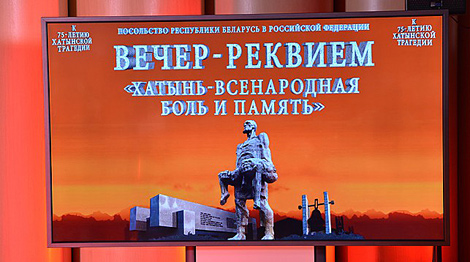 MOSCOW, 22 March (BelTA) – A requiem reception was held in the Business and Cultural Complex of the Embassy of Belarus in Russia on 22 March to commemorate the tragedy of the Khatyn massacre and the hundreds of Belarusian villages, which were burned down by the Nazi during World War Two, BelTA has learned.
MOSCOW, 22 March (BelTA) – A requiem reception was held in the Business and Cultural Complex of the Embassy of Belarus in Russia on 22 March to commemorate the tragedy of the Khatyn massacre and the hundreds of Belarusian villages, which were burned down by the Nazi during World War Two, BelTA has learned.
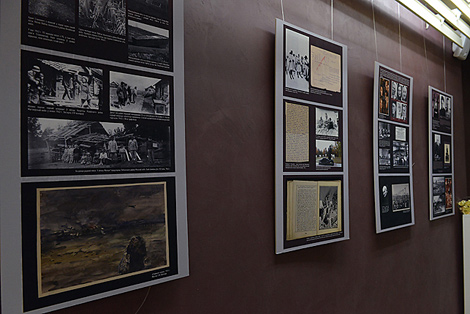 Opening the event, Ambassador Extraordinary and Plenipotentiary of Belarus to Russia Igor Petrishenko said: “Today we bow low as we recall a tragic page in the history of the Belarusian nation — the 75th anniversary of the Khatyn tragedy.” The diplomat noted that commemorative events were held all over Belarus on 22 March because those, who do not remember their past, will have no future. “However, some people have forgotten the lessons of World War Two and some are even trying to rehabilitate Nazism — the plague of the 20th century,” stressed Igor Petrishenko. “These hideous phenomena will never take root in Belarus or the Union State of Belarus and Russia.”
Opening the event, Ambassador Extraordinary and Plenipotentiary of Belarus to Russia Igor Petrishenko said: “Today we bow low as we recall a tragic page in the history of the Belarusian nation — the 75th anniversary of the Khatyn tragedy.” The diplomat noted that commemorative events were held all over Belarus on 22 March because those, who do not remember their past, will have no future. “However, some people have forgotten the lessons of World War Two and some are even trying to rehabilitate Nazism — the plague of the 20th century,” stressed Igor Petrishenko. “These hideous phenomena will never take root in Belarus or the Union State of Belarus and Russia.”
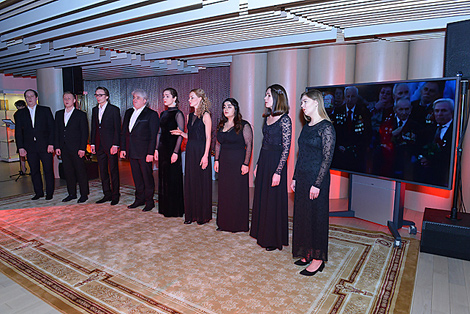 “Belarus has seen its fair share of wars and invasions. Nowadays the country is associated with peace and security in Europe,” stated Igor Petrishenko. “The reliability of the Minsk negotiation platform has been tried and tested by time. It inspires confidence that one can negotiate ways to resolve conflicts here. While terrorism, local wars, interethnic conflicts, and other ones rampage all over the globe, destroying thousands of human lives, the independent and sovereign country of Belarus has preserved stability, accord, and tranquility for more than 25 years of its new history.”
“Belarus has seen its fair share of wars and invasions. Nowadays the country is associated with peace and security in Europe,” stated Igor Petrishenko. “The reliability of the Minsk negotiation platform has been tried and tested by time. It inspires confidence that one can negotiate ways to resolve conflicts here. While terrorism, local wars, interethnic conflicts, and other ones rampage all over the globe, destroying thousands of human lives, the independent and sovereign country of Belarus has preserved stability, accord, and tranquility for more than 25 years of its new history.”
Russian Deputy Minister of Foreign Affairs Alexander Pankin described the Khatyn tragedy as a special symbol of martyrdom. In his opinion, it is necessary to pour more efforts into immortalizing this memory and counteracting attempts to revise results of World War Two. “To prevent more Belarusian and Russian villages from being set on fire,” he said.
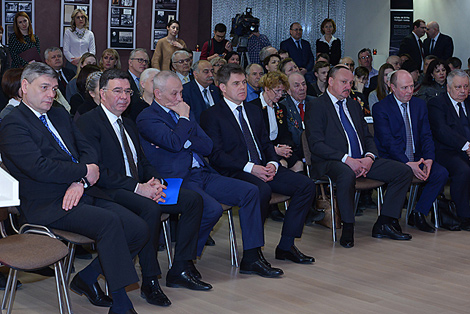 The tragedy of the Khatyn massacre cannot leave people unmoved, noted State Secretary of the Union State of Belarus and Russia Grigory Rapota. He is convinced that such receptions make one think about many things, including the nature of wars and why people kill other people.
The tragedy of the Khatyn massacre cannot leave people unmoved, noted State Secretary of the Union State of Belarus and Russia Grigory Rapota. He is convinced that such receptions make one think about many things, including the nature of wars and why people kill other people.
“Let’s recall what war veterans keep saying: come what may but wars,” said Grigory Rapota. “This message is getting forgotten these days. Some other ideas rise to the surface. Frankly speaking, they make one concerned and sad. So let’s live in ways to avoid wars.”
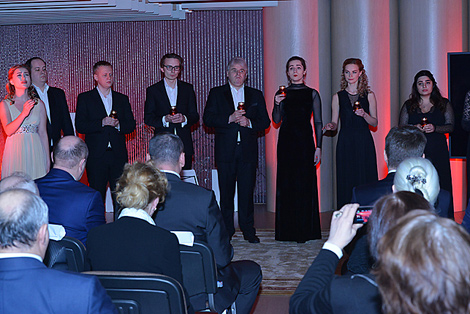 Minister of the Eurasian Economic Commission Valery Koreshkov, Russian MPs, war veterans, representatives of Belarus-Russia Union State bodies, representatives of the Belarusian diaspora, and various diplomats attended the requiem reception.
Minister of the Eurasian Economic Commission Valery Koreshkov, Russian MPs, war veterans, representatives of Belarus-Russia Union State bodies, representatives of the Belarusian diaspora, and various diplomats attended the requiem reception.







 print version
print version make home page
make home page add to bookmarks
add to bookmarks

